The Tale of the Tracks
a recorded history…
The pooka blind (a small one-nut fruit cellar) opened for mischief as a tape-free digital studio in 2012. I was open to a new personality, one with shorter hair, if I failed to make something of it. Tired of carrying around project ideas in my head for decades, I sought the freedom and inner peace only found by making them come out of the speakers. This was a relatively new ambition that Beethoven never knew.
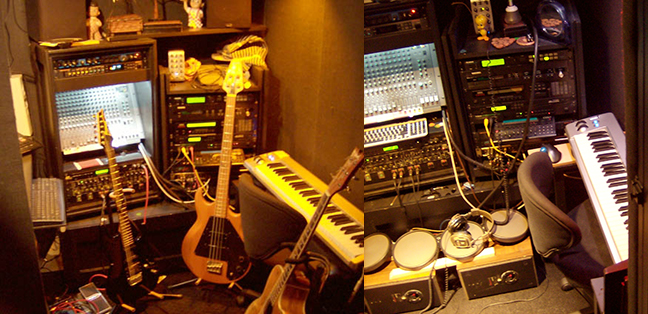
My generation was the one of the first to grow up fully acclimated to speakers. For us, it made a lot more sense for music to come from speakers than from a bunch of lads marching around with horns. Live music had a folksy reputation as being a truer reality than speakers but 60's radio was full of recording artists who were using speakers to create a new sonic reality of their own. Electric organs and guitars existed only in speakers. Speakers became instruments. Having recordings meant that hearing music depended on speakers and no longer depended on the spinet piano in the dining room. Aside from the space program, music recording and the so-called rock band was the greatest technological frontier of the time. Even a small portable cassette recorder with a cheap built in microphone was incredibly empowering. those were the times I was born into and rock banding was all I wanted to do.
I met my first bandmates, Andy and Jeff, in 7th grade because we were seated near each other in class. I could see Andy drawing little stick figure guitar players in his notebook. He drew a mountain of squares and rectangles behind them. They were the amps and speakers. Andy's only ambition was to come out of guitar speakers. We hit it off. We both borrowed our sisters' acoustic guitars and I had a plastic snare drum. For Xmas in '69, Andy got an amp and I got a drum kit. That's where it all started. After nearly a year of hiding the fact that he was a bass player, Jeff joined us with his Fender Jazz bass.
Andy's band (The Cracked Hour or The Us) sprang to life the moment the school day ended and we walked together to Andy's house for a pot of coffee with Cream, Stones, Stooges, Hendrix and some MC5. Those were cover tunes but we mostly did Andy's own riff-songs that he'd jot down in class. There was an album every day.
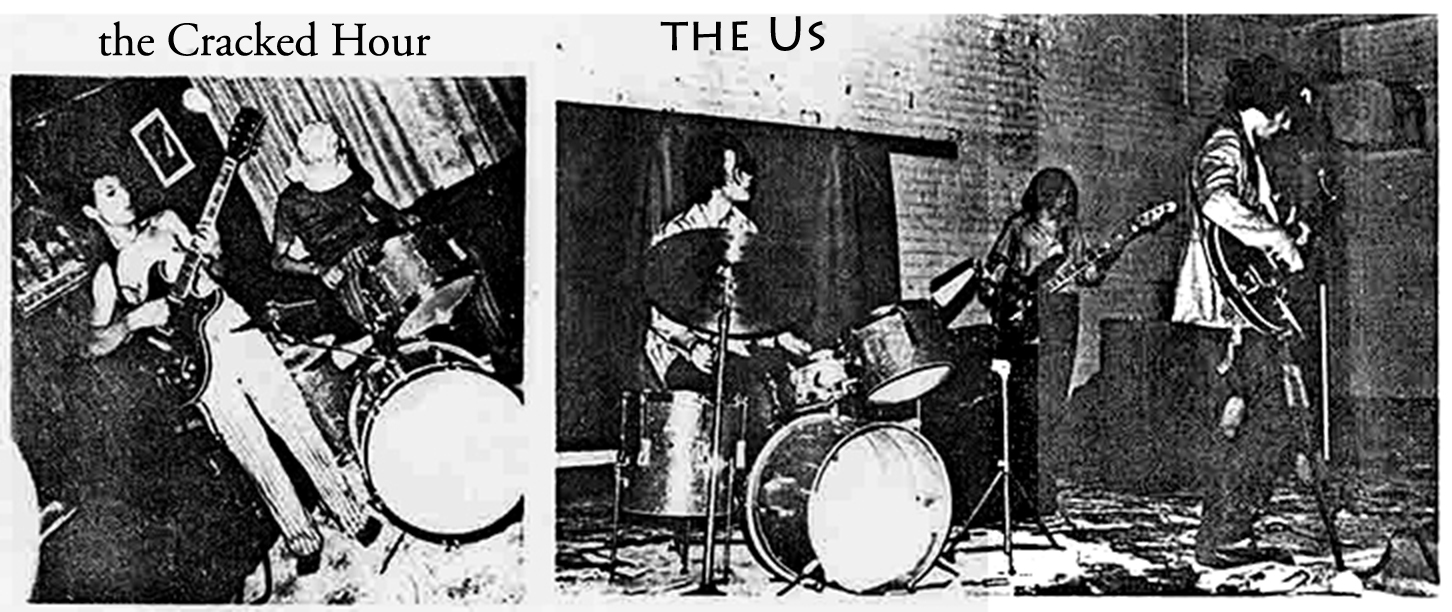
We recorded a couple of times in 1970 with Frank's nice stereo cassette recorder with a pair of matched mics hanging from the ceiling (Frank and I met in sixth grade and bonded over hi-fi gear, bikes and Harlan Ellison). We could not hear the recordings then because there was no means of playback in the house. The deck would have to go to a friend's house who had speakers. Clem first appeared mid-year at school and Andy invited him over to play his parent's spinet piano. He was already an amazing player. Unfortunately, his participation depended on the availability of a piano. Organs were rarely seen except for church.
Back then, rock bands had no place in church. The music was feared to lead children to Satan. Being in a band was considered a declaration of atheism so my parents sent me to see our church's Pastor to Youth. I must have said the right things because he told my parents that it was okay. He said our interest was music and not theology. While we did play Sympathy for thr Devil, we did not feel sympathy for the Devil. However, Mom insisted that I compensate for it by playing viola or joining the school band, neither of which ever came out of speakers. I didn't fit in and was tossed out for unsolicited syncopation.
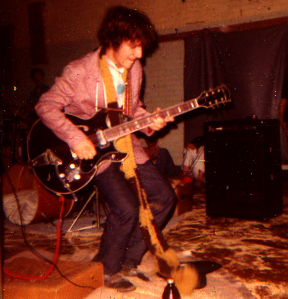
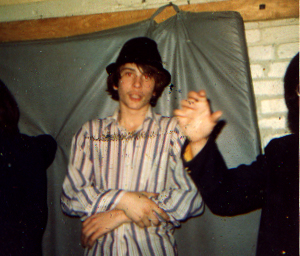
Our best stretch, musically speaking, was the summer of '72 at Jeff's house. We played on the patio one Saturday afternoon until the police came but we got our picture in the local paper. I sort of remember us doing some wildly inventive coffee-stoned stuff with big amps, big speakers (TB-1's) and Jeff's dad's big in-house drum kit. I say sort of remember because Frank was snooted off to Cranbrook and there was no means of recording any of it. The Jeff sessions ended when Andy's amp caught fire.
The emergence of prog rock split Andy's blues-rock band in half. I gave up my roll as Andy's faithful drummer. Clem and I wanted to do something more ambitious and started to operate out of my place in August of '72. Andy had brought in Mark as a rhythm guitarist and I spent at least a year wooing him to join Clem and I. So far, everyone involved had been easy to be pals with music or not. Mark was different. He was my first case of falling for someone's personal musicality but without any underlying pal-ness. He could be cold and transactional but he liked playing with us. I think we grew on him over time. Fiz liked to remain uncommitted and played drums with anyone who asked. By '73, the regulars on the prog team were Mark and me and sometimes Jeff or Karen on guitars, Clem and sometimes me on piano and organ, with Fiz and sometimes Larry on drums. We did stuff off and on. It couldn't be the daily clowning of Andy's band anymore. We were in high school. Junior high seemed like a hundred years ago.
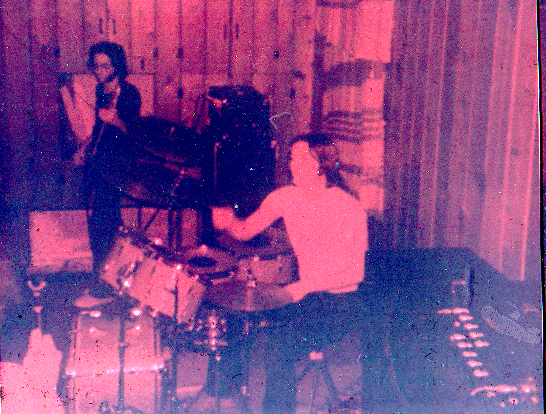
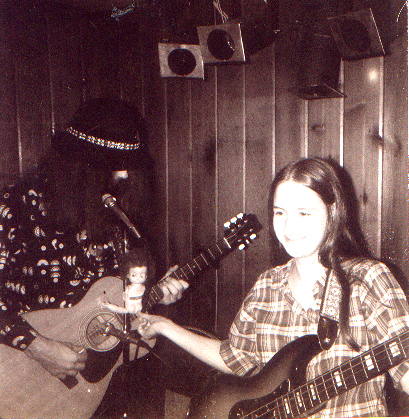
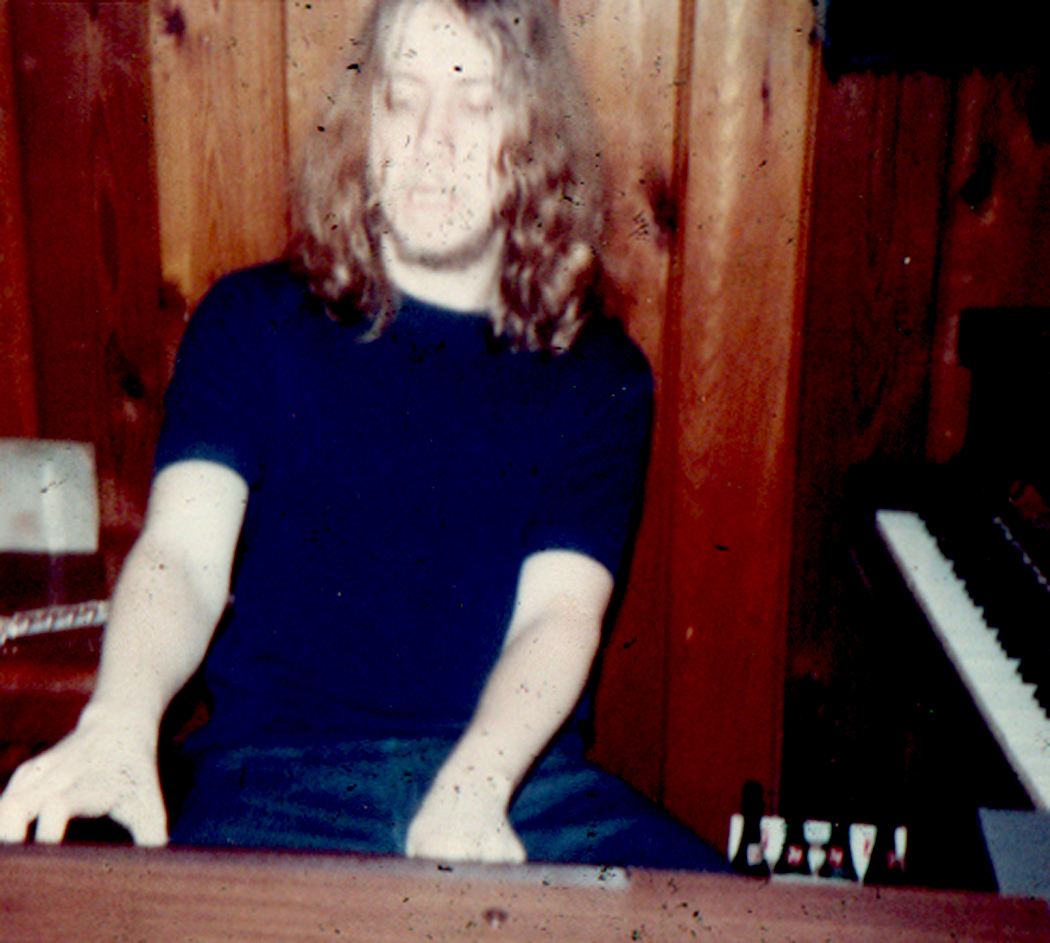

When we weren't doing anything, I would be out canvassing for lads that I could talk into doing something. Like Andy, I became a sort of social hub because I always had something whacky to do. It usually involved recording.
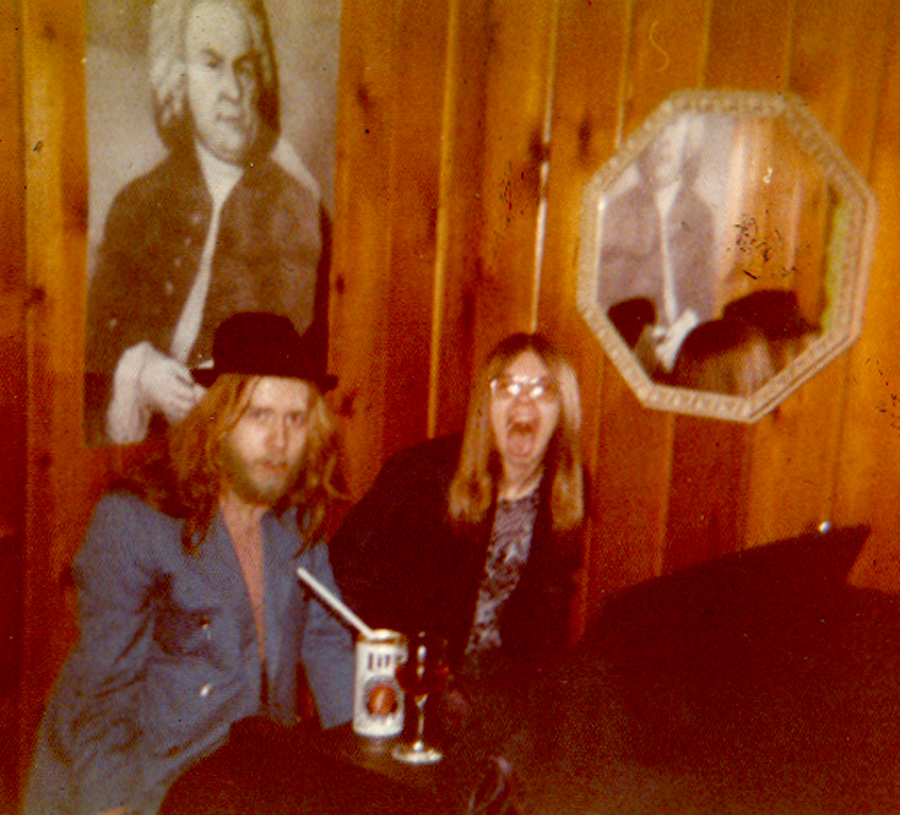
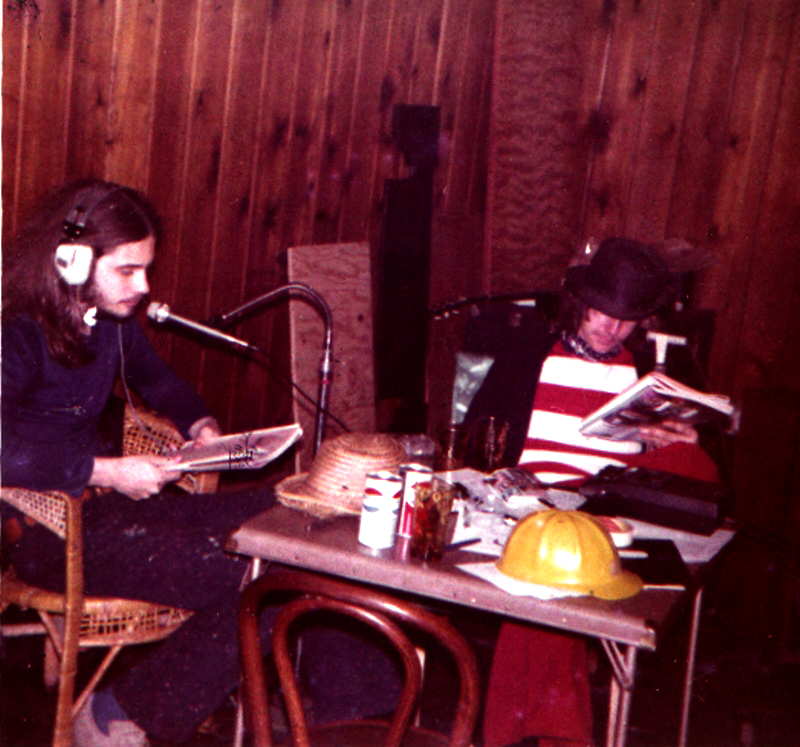
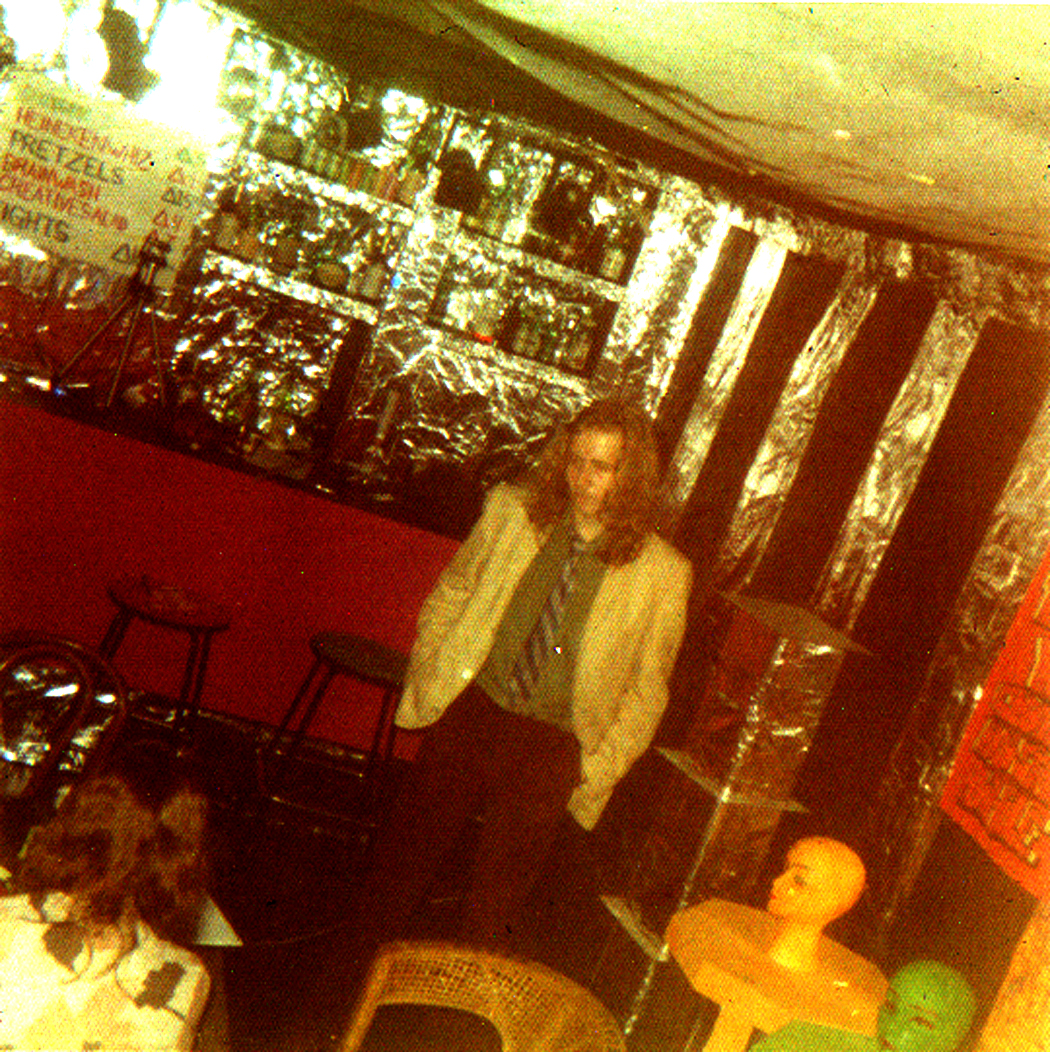

In 1976, we bought (when I say we, I mean Clem) a Dokorder four-track and a box of ten reels. That got things rolling. We could do overdubs and there was always more tape. We got a Dokorder two track for mixdowns. In July of 1977, we rented a store front on 11 Mile. It was common back then for bands to start their own studios with a plan to pay the rent by recording other bands. Ours took a different path and we were out the following summer. For the next few years, recording meant waiting for someone's parents to go away on vacation so we could set up in their house and run snakes down their laundry chute. We never wrecked the place. Not deliberately.
We were all used to hearing ourselves play but it is completely different to hear yourself when you're not playing. Playback was like a trip to the psychiatrist. You're the patient while recording and now you're the doctor during playback. You learn the difference between what you thought you were doing and what you sound like you were doing. Playback is like looking into a mirror with no way to control your face's reflection.
Andy did not like playbacks and preferred to leave the judgment to others. Frank had a horrible wrinkled grimace that he wore when he didn't like something and made sudden wincing squints when he really didn't like something.
Playbacks became the root problem between Mark and me. I thought we played well together. We could read each other and keep up. Looking back, he was my favorite person to play with. Mark had lots of great ideas and we would jam on them. I had some ideas and we would jam on them. I wanted to see the jammy stuff reincarnate into another recording with thoughtful steps of refinement. When that time would come, Mark would balk at it, pick a fight with someone and storm off for a week, a month or a year. He would come back promising to learn parts and develop performable songs. When the time to do so came, off he'd go. We all assumed Mark had the nominal amount of self-command but we were wrong. I hadn't learned this yet. I should have noticed that he wasn't interested in studying and harvesting playbacks like I was. Mark stopped after one go so our stuff mostly stopped developing after one go. It was hard to let go of Mark. Not for his parents apparently. He was institutionalized for a stretch until the State of Mich cut the budgets and set him loose with no where to go.

As an aspiring composer of things to record and playback, my best asset was Clem. He is the most talented and naturally musical person I've ever had the joy to work with. The burden of writing stuff that was worthy of him was ever-present. On the other hand, he could do anything I could dream up in five minutes and do it better in ten. He made everyone try harder just by example. I believed I was up for such composing if only I could round up two or three more lads who were at least half his equal. I thought I was three fifths on a good day. I wrote a lot of easy set-fillers for the new lads and Clem was admirably patient about it.

Fiz was up for it though everyone knew I preferred a heavier approach. Fiz was imaginative, solid and easy to work with. Jazzy and generous. He played drums on all of the recordings for eight years.

Eventually, even ten reels starts to feel confining. Things were getting stolen, starting with the recorders, then some of my instruments. There was no playback at all until we got a Teac 3440 four track and some bigger reels of tape. Our sound guy Frank moved into an old farm house in Troy and we moved into the basement. Mark had returned again and we were recording again until Mark became such a fussbudget that Frank barred him from the house. Two rooms with a window between them were built with a plan to make money recording other folks for reel this time. Our cards said 'Tapir City Studio'. We had four paying customers once we got things going. His roommate (another Jeff) joined another band (Slant Six) and invited them to move in. That brought Bob and his synthesizers and another Teac into the studio.

Things were hopping. I got to record my paperwork-laden Pan project in bits and pieces while also joining Slant Six for a year or two of kinky shows at clubs in Detroit. Then there was a break-in. The control room was trashed and most of its gear was gone. Once again, the tape recorders were stolen. Spirits were crushed.
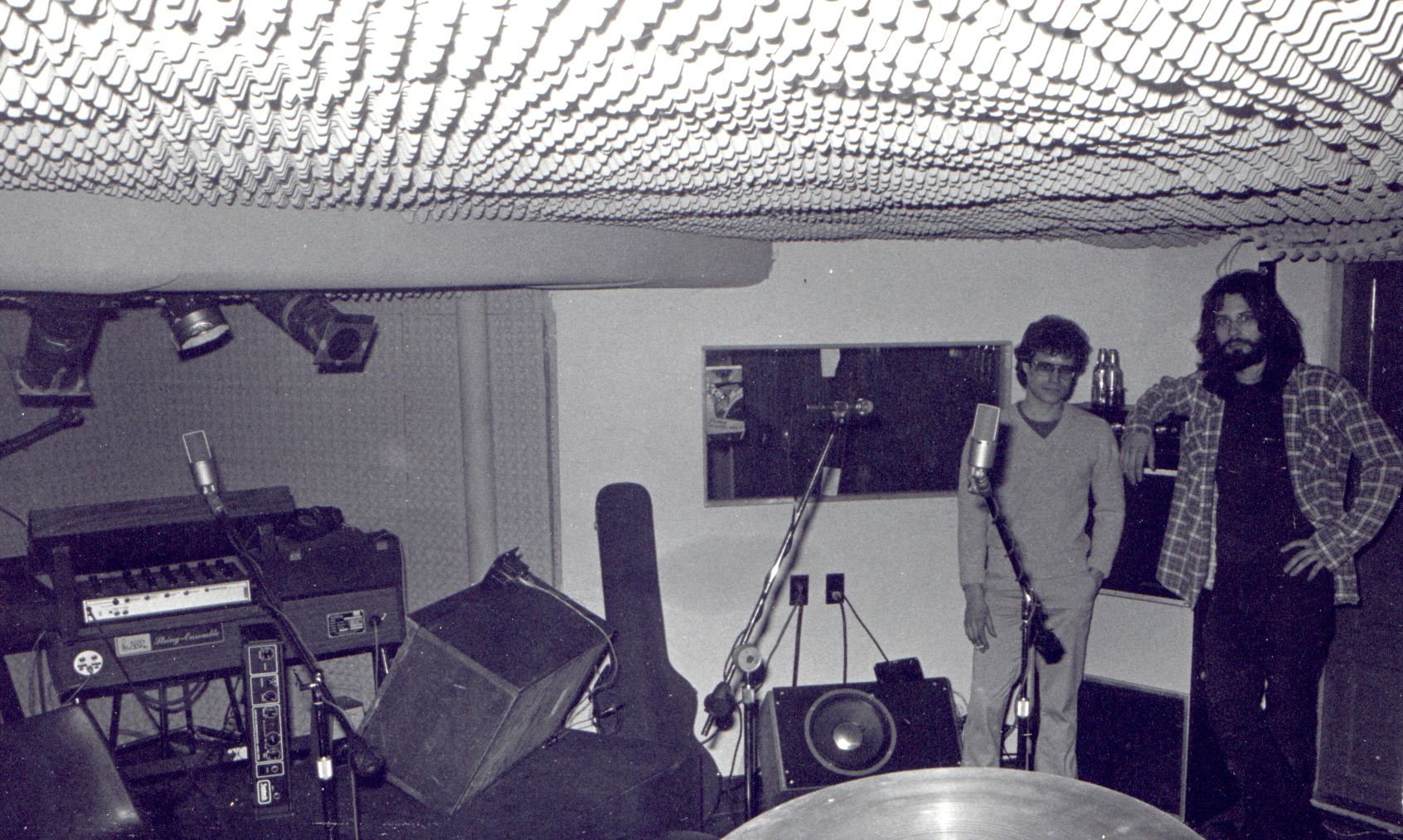
Bob had insurance and soon, another Teac. We were house-hopping again but we mostly spared our parents by this time. Might be why they all moved far away. We recorded at Bob's mom's house and then at his brother Bill's house and eventually Bob bought one of his own. I admit I was determined to turn Bob's band into mine by bringing in Clem and Fiz. We soldiered on Mark-less and without a lead guitar player. We recorded stuff as a doubled quartet with everyone playing another instrument together in a second pass. Robin liked learning parts and filled the guitar post in '83. I was handing out paperwork for songs for In the War Zone that looked like rows of railroad tracks. We mostly rehearsed a live set and recorded the board mix onto a handful of cassettes that flipped over and over. I still have the last flip.
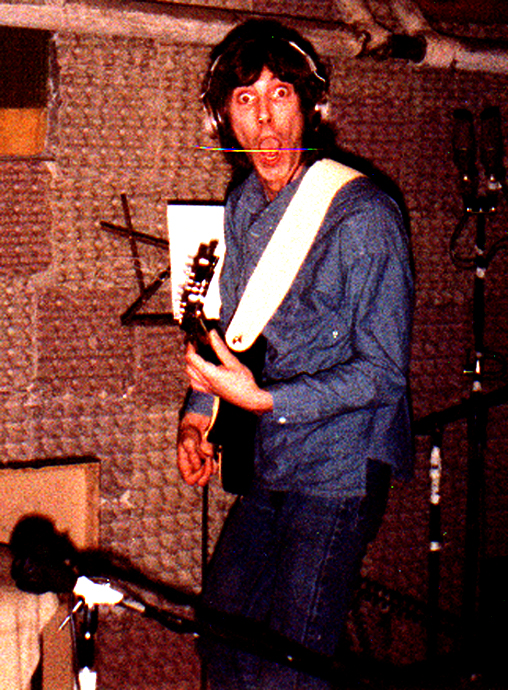
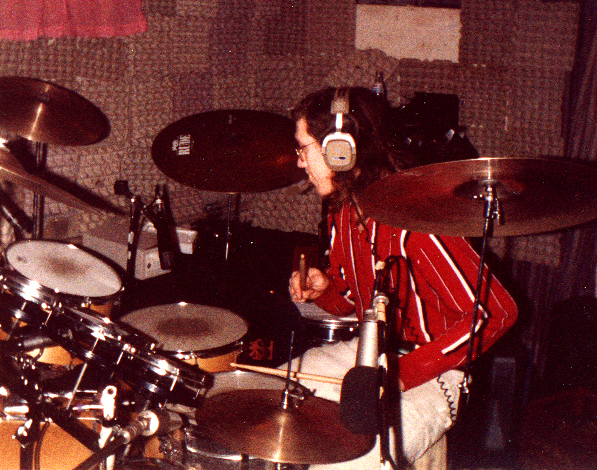
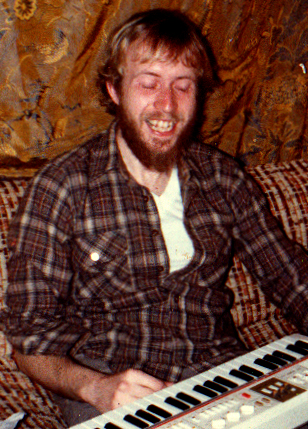
In 1984, we rented an 80-8 and Neotek board for four weeks. We had one reel of half inch tape and squeezed four songs onto it at Bob's house until he missed being able to use his laundry chute. The last week was at my house for one more quick production on my own and second mixdowns onto a rented PCM recorder.


I remember explaining the gear to my five year old daughter while the stuff was stuffed in our house. I said the sound starts on the tape and goes through the spaghetti to the gizmos and then it comes out the speakers. Then, a smaller tape is sent downtown and hopefully, the sound will come out of the little portable radio's speaker. Dad came through because all five songs came out of the radio once or twice on shows that featured local bands.



Robin worked out well until he suddenly up and left to join the Navy. To soften the blow, he introduced us to a young virtuoso as his replacement. Paul played with us for five months. We were videotaped once but I never saw a playback.



Mark returned again for another go that lasted a few weeks. I shoulda known better. It wasn't a sudden fling. We had negotiated for months. I told him about my big plans for In the War Zone and Beefcake Madness. He had stuff he wanted to record. I was sure he did and that it would fit in nicely. We would do his stuff after he was caught up with my stuff. Why? Because I built this bus and he's asking to get on. He said he would learn the parts. He'd be good. We're all grownups. High school was a hundred years ago. Paul had frustrated me by taking too long to learn the songs. We were on a treadmill always waiting for the new guitar player to catch up. New material awaited. Paul had earned more chance than I was giving him but I decided that Mark would get us there much more quickly. Or, I was risking everything on misplaced sentimentality. He nailed the set in two weeks. I was getting very optimistic about what we were sounding like. We started new stuff. Once the effort crossed the threshold of 'a bit demanding', Mark flaked and fled. Forward momentum came to a sudden stop and everything went flying.
Meanwhile… All this time, Bob was letting his younger brother split up mountains of cocaine into little paper pouches on his coffee table. We weren't told about the stash that was kept in the house. I made Bob watch a C-SPAN hearing about the War on Drugs with expanded police powers. We didn't need the risk. We weren't into coke. That didn't matter when the FBI seized Bob's house and car. We had a day to evacuate the gear and find somewhere to stuff it. All of that was 1984. But this is suppose to be a technical history.
After a dark stretch, Frank and I regrouped in '86 and talked the lads and nearly everyone I knew into doing a radio-comedy we were writing called Zug Island: An American Dream. It took two years and a thousand phone calls to see it through. Dialogue was recorded on the four track joined by piles of cassette decks cued up with backgrounds, music and sound effects. Half hour episodes were cued and mixed (after a few rehearsals) all the way through onto a VHS hifi recorder. Hifi VCRs were the poor lad's digital recorder.

The band never regrouped. Bob finally settled his house and car with the feds after nearly two years of limbo and never being charged. He died of a sudden illness shortly after. Clem went on to work on music and instruments based on non-twelve-tone scales. Mark opted to become a homeless street-person and gained weight eating discarded leftovers from posh Royal Oak restaurants. Fiz moved across the state. Andy shot himself. Frank went to Arizona where he eventually gassed himself in his brother's garage. I had all the tape. I wanted to see what the stuff could be sliced, diced and organized into, if anything.

Throughout this history, I would often have enough gear at home for a weekend or two to make some solo recordings and song demos for the band. With the band gone, it was more a matter of begging to borrow guitars, a keyboard or other gear for quick recording stints. My clout as the hub-guy had vanished. I had been so spoiled by that for ages. I no longer spoke for Our Great Musical Cause. Just me, the mooch. I borrowed a Simmons drum kit for a day and spent most of it trying to rustle up some drum sticks (it was a holiday). I ended up using Bob's wooden spoons. I traded tech work for studio time. I had a few productive years with a Fostex 8-track rig in the house in the '90's. I had hand-me-down computers with Windows 95 running the MIDI interface until 2010. By that time, a personal reckoning was long overdue. I had messed up my hands for playing and was busy with my new more noticeably-paid career as a LED fixture designer. Perhaps it was time to press stop.

What was the enduring appeal of all this? A life of actual rock n roll travel was never very appealing and I certainly did not have the sight for it. While it is handy being my own tech, the gizmos are such a fuss. It's all about composing music and making it come out of speakers. Brain activity becomes air wiggles. Music heard by thinking becomes heard without thinking. That's what playback is all about.
Tracks from this story are gathered in a collection called Shaking the Ether. Volume One appears below. Volume Two is here.
































